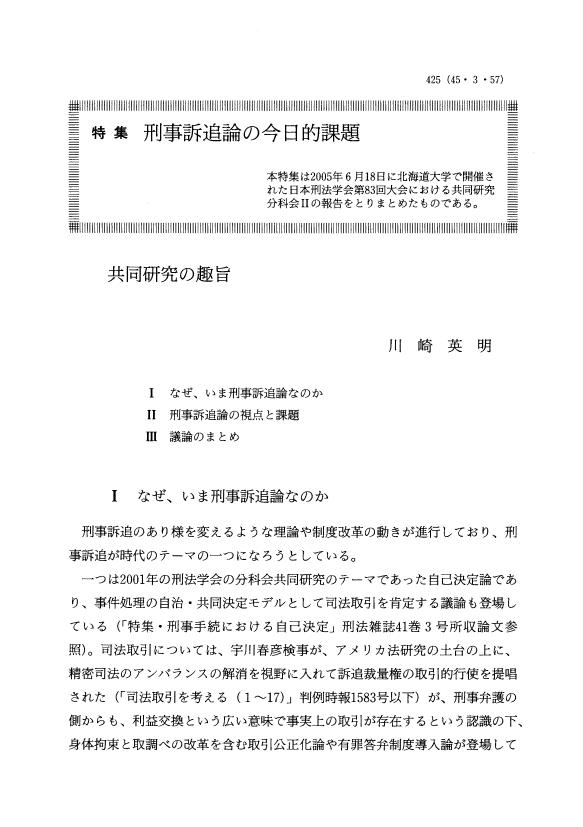- 著者
- 川崎 英明
- 出版者
- 日本評論社
- 雑誌
- 法の科学 : 民主主義科学者協会法律部会機関誌「年報」 (ISSN:03856267)
- 巻号頁・発行日
- no.47, pp.133-138, 2016
- 著者
- 川崎 英明
- 出版者
- 関西学院大学
- 雑誌
- 法と政治 (ISSN:02880709)
- 巻号頁・発行日
- vol.58, no.1, pp.55-83, 2007-04
One of the contemporary issues in modern criminal procedure is whether a police officer may investigate any person whom he has reasonable grounds to suspect of committing a crime. I researched the Horikoshi-Case in examining this issue. In this case a civil servant handed out political leaflets in violation of the national public servant law that prohibits civil servants from participating in political movements. A prosecuter filed an indictment against him. In the investigation by the police before the indictment, police officers had been following and video-taping him for 29 days. This case has two disputed points. One is the question of whether a police officer may investigate any person whom he has reasonable grounds to suspect of committing a crime, which in this case is the act of handing out political leaflets. The other is the question of the legality of following and video-taping as a means of the investigation, which may invade a person's privacy. In my opinion, the constitutinal law and the criminal procedural law don't permit police officers to begin an investigation before a crime is committed. Therefore, the investigation in this case is not only an invasion of privacy but also illegal. This paper consists of following sections. 1 The problems of the Horikoshi-Case. 2 Examination of the investigation of this case. 3 Can police officers begin to investigate before a crime is committed? 4 The illegality of following and video-taping as a means of the investigation. 5 Conclusion.
1 0 0 0 OA 共同研究の趣旨
- 著者
- 川崎 英明
- 出版者
- 日本刑法学会
- 雑誌
- 刑法雑誌 (ISSN:00220191)
- 巻号頁・発行日
- vol.45, no.3, pp.425-428, 2006-04-30 (Released:2020-11-05)
1 0 0 0 OA 刑事法学と心理学-刑事裁判心理学の構築に向けて-
- 著者
- 白取 祐司 仲真 紀子 川崎 英明 今井 猛嘉 高倉 新喜 田中 康雄 松村 良之 藤田 政博 森直 久 城下 裕二 内藤 大海
- 出版者
- 北海道大学
- 雑誌
- 基盤研究(A)
- 巻号頁・発行日
- 2007
刑事裁判において法心理学は、法専門家(実務法曹)と司法に関わる市民とりわけ裁判員の間のコミュニケーションの実証分析、刑事司法に対する実務家、市民の意識分析による制度見直しへのデータ提供など、様々なかたちで貢献しうることを、実験や調査等を通して明らかにしてきた。また、子どもに対する心理学的観点からの面接法の研究を進め研修など実践段階までいたったほか、外国調査により、刑事司法における心理鑑定の制度化の可能性と必要性を示すことができた。


